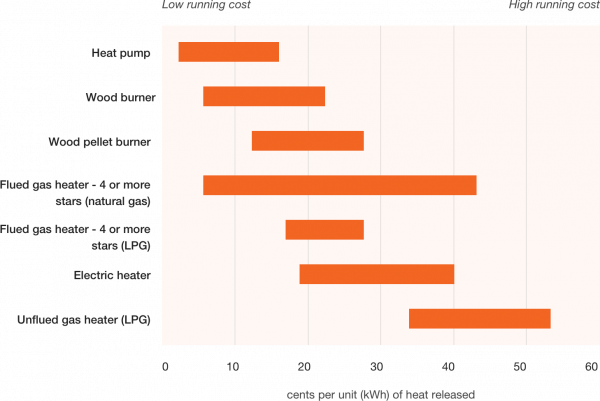How you use a room will help you to decide the type of heater that’s most suitable. For larger rooms you want to heat regularly, like a living room, it’s worth paying a bit more upfront for a fixed heater with lower running costs and more heat output than an electric heater.
This could be a modern wood or wood-pellet burner, an energy efficient heat pump, or a four-star flued gas heater. Electric heaters may be enough for smaller rooms and rooms you only heat occasionally, like bedrooms - they’re cheap to buy but more expensive to run.
Home heating running costs

The lower end of the running cost ranges represents the highest efficiency heaters and lowest fuel prices, and no fixed charges attributed to space heating. The higher end of the running cost ranges represents low efficiency heaters, high fuel prices and fixed charges fully attributed to space heating (for natural gas and LPG (45kg bottles) only).
Guide to reading home heating running costs chart
Based on typical highest and lowest heater efficiencies for new heaters, and typical highest and lowest fuel prices. Flued gas heaters with a star rating of less than 4 stars and older heat pumps, woodburners and gas heaters may have lower efficiencies, resulting in higher running costs. For unflued gas heaters 30% of the heat produced is assumed to be lost due to the need to leave a window open. Purchase, installation and maintenance costs are not included.
Fuel cost assumptions:
Electricity 19-40c/kWh; firewood $50-150/m3; wood pellets 55-93 c/kg; natural gas 5.4-11.2 c/kWh variable price; LPG (45kg bottles) $92-110 per refill; LPG (9kg bottle) $27-42 per refill.
Consideration of fixed charges:
No fixed charges have been included for electricity, firewood, wood pellets and LPG (9kg bottle).
For natural gas and LPG (45kg) fixed charges have only been included for the higher end of the running cost ranges, assuming a total annual gas consumption of 3,000 kWh, fixed charges of up to $1.45/day for natural gas and up to $115 annual bottle rental charge for LPG (45kg bottles). This represents households where gas is only used for space heating. For the lower end of the running cost ranges, no fixed charges have been included, representing situations where gas is also used for other purposes than just space heating.
Heat pumps
| Good for: | Be aware that: |
- low running costs (when you use them properly)
- producing instant heat
- convenience - you can control the temperature with the thermostat and use the timer.
| - they must be sized correctly - for the space and the climate - to work well (if you live in a colder area, ask the supplier to size the heat pump based on its low temperature performance)
- some are a lot more efficient than others - look for the Energy Rating Label (the more stars, the more energy efficient)
- they won't work during a power cut.
|
Modern woodburners
| Good for: | Be aware that: |
- low running costs, especially if you have access to free or cheap firewood
- the environment - if used correctly, they produce very little pollution and use renewable wood energy
- heating large spaces
- heating hot water in winter through a wetback system.
| - firewood must be dry to burn cleanly and efficiently, so you need to plan ahead and store it undercover, ideally for at least 12 months
- you need a building consent to install one and - unless your property is larger than two hectares - you need to use a woodburner on the approved list from the Ministry for the Environment.
|
Ministry for the Environment's list of approved wood burners
Find out what to look for in a wood burner and compare models - Consumer website
Wood pellet burners
| Good for: | Be aware that: |
- the environment - the pellets are made from waste products and burn cleanly
- heat control (better than a wood burner)
- heating large spaces
- heating hot water in winter through a wetback system.
| - unless you get an optional battery backup, they won't work if your electricity isn't working (they use a small amount of electricity)
- you cannot burn firewood in a pellet burner
- you need a building consent to install one
- only authorised burners can be used in areas with poor air quality
|
Flued gas (natural or LPG) heaters or fireplaces
| Good for: | Be aware that: |
- convenience - you can control the temperature with the thermostat and use the timer
- heating large spaces.
| - you will have to pay a fixed charge for reticulated gas supply (if you don't already)
- running costs are relatively high if you use LPG bottles
- while burning gas is relatively clean, the greenhouse gas emissions contribute to climate change
- you must have your gas heater installed by a registered gas fitter.
|
Electric heaters
| Good for: | Be aware that: |
- heating smaller spaces, like bedrooms
- very cheap to buy.
| - they are more expensive to run than most other heating options
- their heat output is low compared to most other heater types
- all electric heaters are equally efficient as they convert all the electricity they use into useful heat
- there are different types (radiant, convection, fan) that deliver heat in different ways to suit different situations
- many have built-in thermostats, but generally they aren't very accurate.
|
Central heating
| Good for: | Be aware that: |
- providing heating for your entire house
- convenience - you can control the temperature with the thermostat and use the timer
- zoning - many are zone-controlled so you can control the temperature in different parts of the home.
| - Can be expensive to install
- heat can be supplied by a range of heating systems for example gas, wood pellet or heat pump
- it’s worth choosing a system that has an individual thermostat for each room
- can be very expensive to run if your house isn't well insulated or is draughty.
|
Unflued gas (natural or LPG) heaters, including portable gas heaters
| Good for: | Be aware that: |
- back-up heating during power cuts, if your normal heating relies on electricity to operate.
| - unflued portable gas heaters are the most expensive form of heating (except for some open fires)
- there are health risks - it will pollute air with toxic gases and large amounts of water vapour, so you must keep at least one window open when it’s in use and never use in bedrooms
- they can make your home damp and mouldy
- portable gas heaters can be a fire risk, as anything too close can quickly catch alight.
|
Source: Energywise




